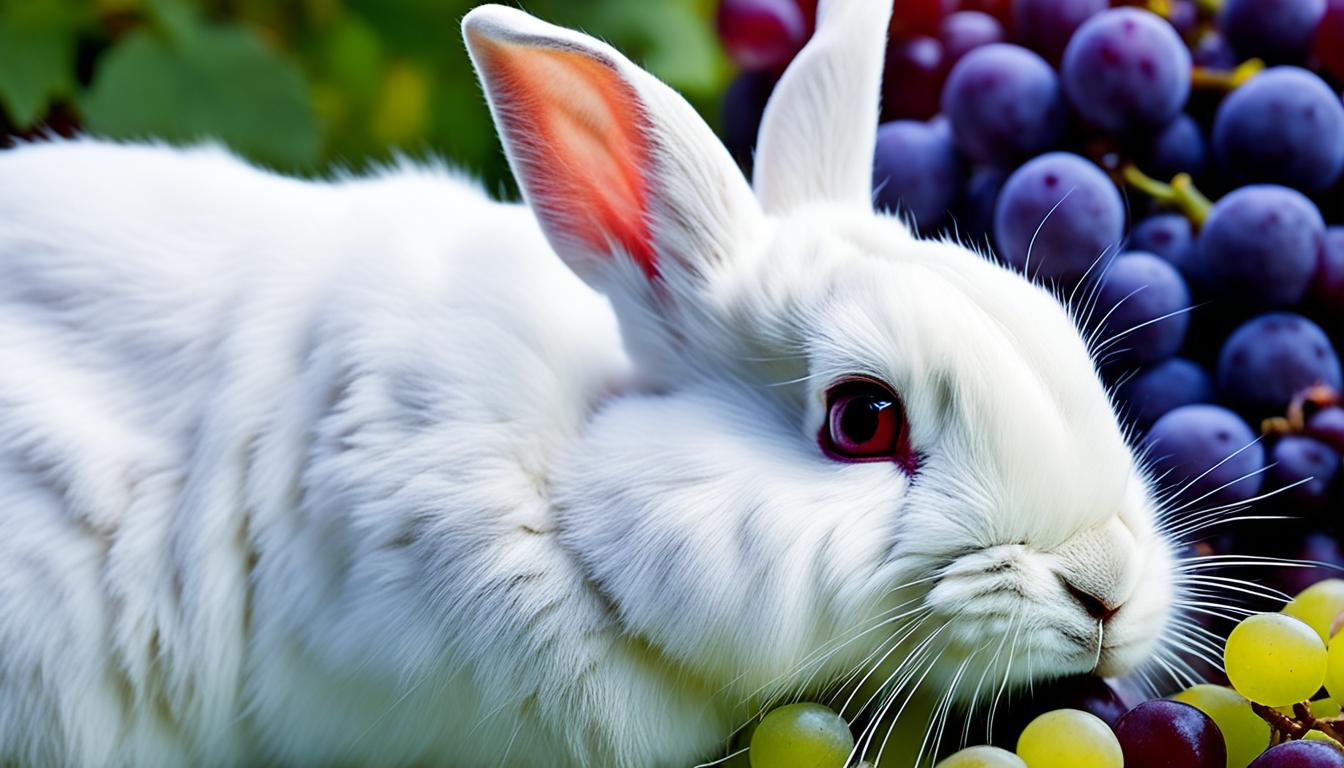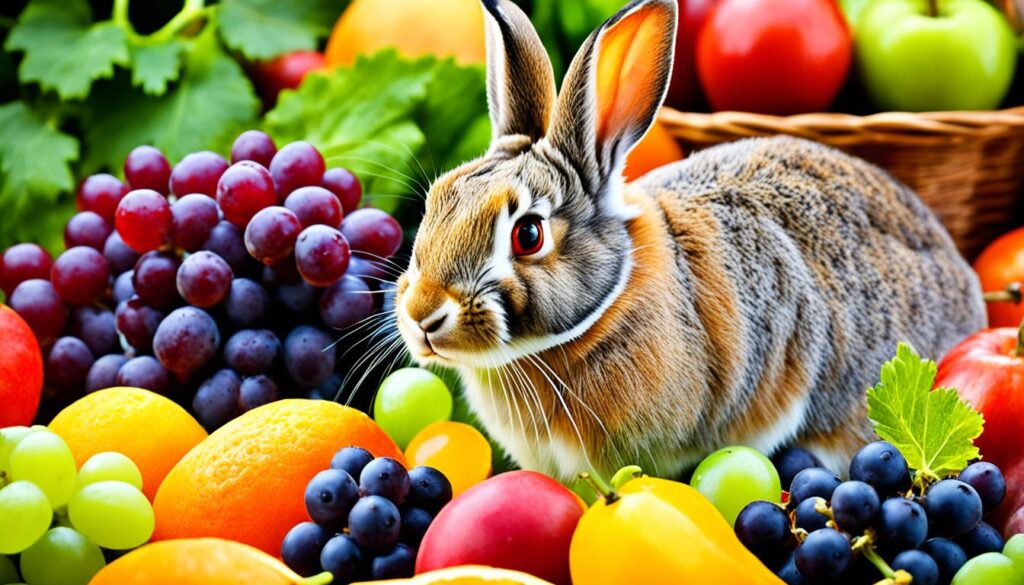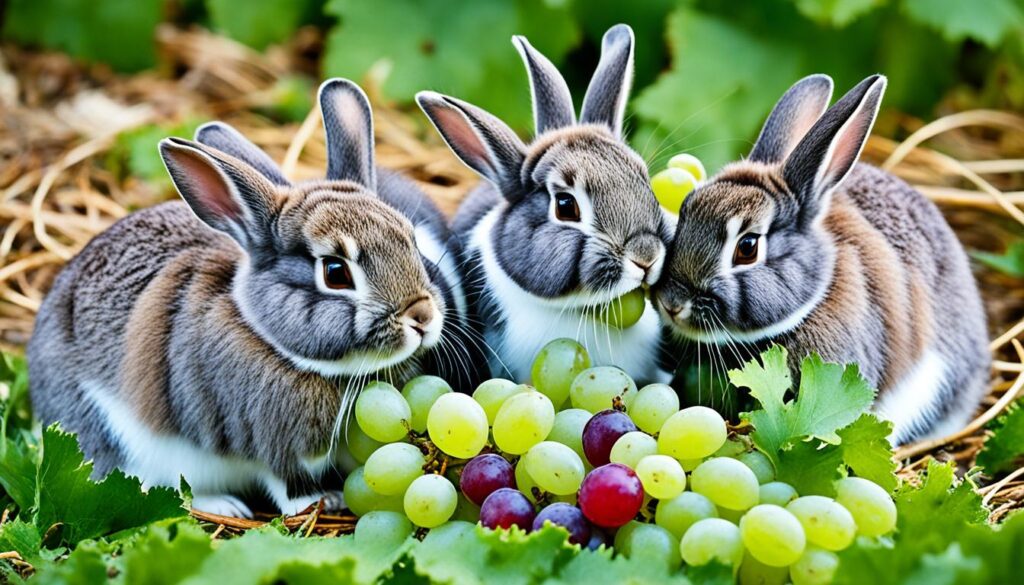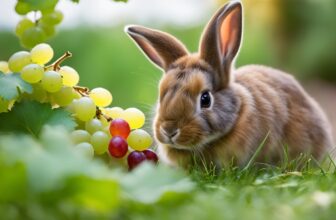Can Rabbits Eat Grapes? A Pet Owner’s Guide

As a rabbit owner, you may have wondered if your furry friend can indulge in the juicy delights of grapes. After all, grapes are a popular fruit, and it’s natural to want to share them with our beloved pets. However, before you hand over a bunch of grapes, it’s essential to understand the nutritional needs and potential risks associated with feeding this fruit to rabbits.
Key Takeaways
- Rabbits can eat small amounts of grapes as an occasional treat, but moderation is key.
- Grapes should not make up a significant portion of a rabbit’s diet, as they are high in sugar and can cause digestive issues.
- Baby rabbits under 12 weeks old should avoid grapes and other fruits until their digestive systems are more mature.
- Grape seeds can pose a choking hazard or cause intestinal blockages, so it’s important to remove them before feeding grapes to rabbits.
- Grapes provide some beneficial nutrients like antioxidants, vitamins, and minerals, but they should be considered a supplementary food, not a dietary staple.
Introduction to Rabbit Diets and Grapes
Rabbits require a carefully balanced diet to maintain their health and well-being. While their primary diet should consist of hay, fresh greens, and a small amount of rabbit pellets, it’s also acceptable to provide occasional treats like fruits and vegetables. One such treat that many rabbit owners are curious about is grapes.
The Importance of a Balanced Diet for Rabbits
Rabbits are herbivores, and their diet should be predominantly made up of hay, which provides essential fiber to promote healthy digestion and prevent dental issues. Alongside hay, rabbits should also have access to fresh greens and a limited amount of high-quality pellets. It’s crucial to ensure that rabbits receive a balanced diet to meet their nutritional needs and support their overall health.
Grapes as a Potential Treat for Rabbits
Grapes can be a healthy and enjoyable treat for rabbits when fed in moderation. However, it’s essential to understand the nutritional value and potential risks associated with feeding grapes to your rabbit. While grapes can provide some beneficial vitamins and antioxidants, they are also high in sugar, which can lead to weight gain and other health problems if consumed in excess.
“Rabbits should only be given small amounts of fruit to avoid weight gain and tooth decay; bananas and grapes, high in sugar, should be limited to 2-3 times a month.”
To ensure your rabbit’s well-being, it’s crucial to introduce grapes and other fruits gradually and in small quantities. As with any treat, moderation is key when it comes to feeding grapes to your rabbit.
Nutritional Value of Grapes for Rabbits
Grapes can provide some valuable nutrients for rabbits, making them a viable treat option when fed in moderation. However, it’s important to understand the nutritional profile of grapes and how they can impact a rabbit’s overall health and dietary needs.
Vitamins and Minerals in Grapes
Grapes are a good source of several essential vitamins and minerals that can benefit rabbits. A single cup of fresh grapes contains:
- 3 milligrams of copper
- 0.1 milligram of manganese
- 0.1 milligram of vitamin B6
- 0.1 milligram of riboflavin
- 22 micrograms of vitamin K
- 0.1 milligram of thiamine
These nutrients can support a rabbit’s overall health, including their immune system, bone development, and nervous system function.
Antioxidants and Other Beneficial Compounds
Grapes are also rich in antioxidants, such as resveratrol, that can help protect against cell damage and reduce the risk of certain diseases. Additionally, grapes contain beneficial compounds like flavonoids, which have anti-inflammatory properties and may contribute to a rabbit’s overall well-being.
However, it’s important to note that grapes are also high in natural sugars, which can be problematic if fed in excess. Moderation is key when incorporating grapes into a rabbit’s diet to ensure they receive the potential benefits without the risks of digestive issues or other health problems.

| Nutrient | Amount in 1 Cup of Grapes |
|---|---|
| Fiber | 5 grams |
| Protein | 1 gram |
| Carbohydrates | 5 grams |
| Calories | 104 |
| Fat | 0.2 grams |
The key is to feed grapes in moderation and as a complement to a rabbit’s primary diet of hay, fresh vegetables, and a limited number of pellets. This will allow rabbits to safely enjoy the potential health benefits of grapes without the risks associated with overconsumption.
do rabbits eat grapes
While rabbits can safely consume grapes in small amounts, it’s crucial to exercise moderation when feeding this sweet fruit. Grapes are high in natural sugars, and overfeeding can lead to digestive problems such as diarrhea, gas, and bloating. In addition, the high sugar content can potentially contribute to the development of diabetes in rabbits.
Moderation is Key
To avoid the risks associated with grape consumption, it’s recommended to limit grapes to a few per day, no more than a few times per week, and ensure they are part of a balanced diet. Rabbits should not be fed grapes excessively, as this can disrupt their nutritional balance and lead to health issues.
Potential Risks of Overfeeding Grapes
- Digestive issues: Diarrhea, gas, and bloating
- Weight gain and diabetes: The high sugar content can contribute to these conditions
- Gastrointestinal stasis: Lethargy, teeth grinding, and lack of appetite
- Choking hazard: Grape seeds can pose a choking risk
In addition to the potential risks, rabbits may develop a preference for sugary grapes over their regular diet, which can further disrupt their nutritional balance. It’s essential to maintain a varied and balanced diet for your rabbit’s overall health and well-being.

To ensure your rabbit’s safety, it’s crucial to choose seedless grapes, wash them thoroughly, and serve them in moderation as an occasional treat. By understanding the risks and rewards of feeding grapes to rabbits, pet owners can make informed decisions that prioritize their furry friend’s health and happiness.
Preparing and Feeding Grapes to Rabbits
When it comes to feeding grapes to your rabbit, it’s essential to choose the right variety and prepare them properly. Seedless grapes are the safest option, as the seeds can pose a serious choking hazard or cause intestinal blockages if ingested by your furry friend.
Choosing the Right Variety of Grapes
Rabbits have a preference for sweet foods like grapes due to their sugary taste. However, it’s important to remember that grapes should only be given as an occasional treat, not a dietary staple. A suggested feeding amount for rabbits would be around four or five grapes per week.
According to the Shopper’s Guide to Pesticides, commercial grapes have one of the highest amounts of pesticide residue among fruits and vegetables. Therefore, it’s crucial to thoroughly wash the grapes before serving them to your rabbit to remove any potential contaminants.
Proper Washing and Serving Methods
- Thoroughly wash the grapes under running water to remove any pesticides or dirt.
- Remove the seeds and skin, as they can be a choking hazard or cause digestive issues for rabbits.
- Cut the grapes into bite-sized pieces, making it easier for your rabbit to enjoy without the risk of choking.
- Serve the grapes in moderation, monitoring your rabbit’s reaction to ensure they are tolerating the treat well.
Remember, grapes should only be given to rabbits in their fresh form, as dried grape products may not be digested properly. Introducing new foods gradually and in moderation is key to maintaining your rabbit’s health and keeping their digestive system functioning smoothly.
“Experiments at the 2009 Experimental Biology at New Orleans have shown that animals fed grapes or grape powder have healthier hearts with less damage.”
By following these guidelines, you can safely and responsibly incorporate grapes into your rabbit’s diet as an occasional treat, providing them with a tasty and nutritious snack while prioritizing their overall well-being.
Alternative Rabbit-Safe Fruits
While grapes can be a suitable treat for rabbits in moderation, there are other rabbit-safe fruits that can provide your furry friend with a tasty and nutritious addition to their diet. These alternative options not only offer variety but also help maintain a balanced and healthy feeding plan.
Some recommended rabbit-safe fruits include:
- Apples (without seeds)
- Berries, such as blueberries, raspberries, and blackberries
- Melon, including watermelon and cantaloupe
- Pears
- Bananas
These fruits should be introduced gradually and in moderation, as they can be high in natural sugars. Experts suggest that rabbit-safe fruits should not exceed 2% of a rabbit’s total diet. Overfeeding on fruits can lead to digestive issues, such as ileus, a potentially life-threatening condition.
When incorporating rabbit-safe fruits into your rabbit’s meal plan, it’s essential to carefully monitor their reaction and adjust the portions accordingly. Small, bite-sized pieces are recommended, and rabbits should be closely observed for any signs of discomfort or distress.
In addition to providing a variety of tasty treats, rabbit-safe fruits can offer valuable nutrients, such as vitamins, minerals, and antioxidants, that can support your rabbit’s overall health and well-being. However, it’s crucial to maintain a balanced diet that is primarily composed of high-quality hay, fresh greens, and a small amount of pellets.
By incorporating a variety of rabbit-safe fruits into your rabbit’s diet, you can ensure that your furry friend enjoys a diverse and nutritious feeding regimen, while also providing them with occasional, small-portioned treats that can enhance their overall well-being.
Conclusion
In summary, rabbits can safely consume grapes in moderation as an occasional treat, but it’s essential to keep in mind the potential risks and benefits. do rabbits eat grapes, rabbit diet, and can rabbits have grapes are important considerations when incorporating this fruit into your rabbit’s diet.
Grape nutrition for rabbits includes vitamins, minerals, and antioxidants that can provide health benefits, but the high sugar content can also lead to digestive issues if consumed excessively. Feeding rabbits grapes requires a careful approach, with a focus on providing the right variety, portion size, and proper preparation methods to ensure your rabbit’s safety and wellbeing.
By understanding the are grapes safe for rabbits and exploring rabbit-safe fruits as alternatives, you can create a balanced and varied diet that meets your rabbit’s nutritional needs. Remember, rabbit treats like grapes should only be offered in moderation, and a diverse array of hay, leafy greens, and specific vegetables should make up the foundation of your rabbit’s daily sustenance.







